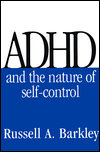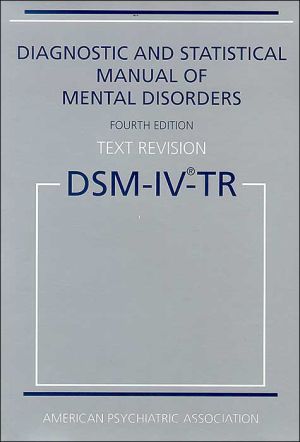ADHD and the Nature of Self-Control
This far-reaching work from renowned scientist-practitioner Russell A. Barkley provides a radical shift of perspective on ADHD. The volume synthesizes neuropsychological research and theory on the executive functions, illuminating how normally functioning individuals are able to bring behavior under the control of time and orient their actions toward the future. Meticulously applying this model to an examination of the cognitive and social impairments manifested by ADHD, Barkley offers...
Search in google:
This far-reaching work from renowned scientist-practitioner Russell A. Barkley provides a radical shift of perspective on ADHD. The volume synthesizes neuropsychological research and theory on the executive functions, illuminating how normally functioning individuals are able to bring behavior under the control of time and orient their actions toward the future. Meticulously applying this model to an examination of the cognitive and social impairments manifested by ADHD, Barkley offers compelling new directions for thinking about and treating this disorder. Booknews Barkley (psychology, psychiatry, & neurology, U. of Massachusetts Medical Center) offers a counter to current conceptualizations of Attention Deficit Hyperactive Disorder, arguing that it is fundamentally a problem of self-control, and that inattention is a secondary characteristic. His hypotheses draw on neuropsychological research concerning the ability to delay one's response to external stimuli and the development of the executive functions involved in self-control. Implications for research and clinical practice are significant. Annotation c. by Book News, Inc., Portland, Or.
Ch. 1The Nature of Attention-Deficit/Hyperactivity Disorder1Ch. 2Biological Etiologies Associated with ADHD29Ch. 3Defining Behavioral Inhibition, Self-Control, and Executive Function47Ch. 4Behavioral Inhibition and ADHD65Ch. 5Neuropsychological Views of the Executive Functions: The Origins of a Hybrid Model83Ch. 6Additional Evidence Supporting the Existence of the Executive Functions108Ch. 7Constructing the Hybrid Model of Executive Functions154Ch. 8Developmental Considerations: Self-Control as an Instinct209Ch. 9Extending the Hybrid Model of Executive Functions to ADHD235Ch. 10Evidence Supporting Executive Function Deficits in ADHD260Ch. 11Understanding ADHD and Self-Control: Social and Clinical Implications312References351Index399
\ From the Publisher"This is a masterful synthesis of what we know about ADHD from the clinic and the laboratory. Dr. Barkley's focus on the failure of hyperactive children and adults to inhibit their behavior has major and useful implications for diagnosis and treatment. This book will make a lasting contribution." --Judith Rapoport, MD\ "Kudos to Russell Barkley for his courage and tenacity in producing this elegant and eloquent synthesis of facts and concepts about ADHD. Besides being a landmark work of neuropsychiatric importance, this book is a great example of the best in scientific thought, bursting with a joyful creativity that is grounded in but not constricted by accumulated knowledge and conventional wisdom." --Martha Bridge Denckla, MD\ "An important theoretical contribution that will generate a great deal of research interest. More importantly, the new clinical approaches that stem from this framework may be of significant immediate and long-term benefit to our patients." --Lily Hechtman, MD, FRCP, McGill University\ \ \ \ \ \ \ Contemporary Psychology"Not only does this book provide a comprehensive history of ADHD, but it also offers new perspectives on the contributions of behavioral inhibition and executive functions to the syndrome. Numerous behavioral indicators that were not accounted for by prior theories are addressed by Barkley's new paradigm. This book is essential reading [and] furnishes valuable information for psychologists, psychiatrists, and educators."--Contemporary Psychology\ \ \ Psychiatric Services"Many of the ideas presented...are highly sophisticated. Yet the book is extremely reader friendly....All terms are clearly explained, and the reader is carefully walked through all logical leaps. Overall, the book presents what could be considered the first comprehensive theory of attention-deficit hyperactivity disorder....It leads to numerous testable hypotheses, and as such, it is likely to stimulate thinking, empirical research and controversy well into the 21st century."--Psychiatric Services\ \ \ \ \ Journal of Cognitive Psychotherapy"This is an extremely important text, full of information and ideas....Will generate much discussion and research....The clinical implications are also very provocative, especially for clinicians using cognitive or meta-cognitive techniques....This is a seminal contribution and worthwhile reading for any serious student of ADHD."--Journal of Cognitive Psychotherapy\ \ \ \ \ Bulletin of the Menninger Clinic"Eloquently offers a fundamentally different way of understanding the many lifelong psychosocial struggles that persons with ADHD have to cope with....The author's model is of enormous value in clinical efforts to find answers to some frequently asked questions....This book will undoubtedly be remembered as one that changed the way clinicians responded to the requests of parents, siblings, and spouses wishing to find a way to nurture rather than to react with anger, which is frequently elicited by their loved ones with ADHD."--Bulletin of the Menninger Clinic\ \ \ \ \ BooknewsBarkley (psychology, psychiatry, & neurology, U. of Massachusetts Medical Center) offers a counter to current conceptualizations of Attention Deficit Hyperactive Disorder, arguing that it is fundamentally a problem of self-control, and that inattention is a secondary characteristic. His hypotheses draw on neuropsychological research concerning the ability to delay one's response to external stimuli and the development of the executive functions involved in self-control. Implications for research and clinical practice are significant. Annotation c. by Book News, Inc., Portland, Or.\ \








